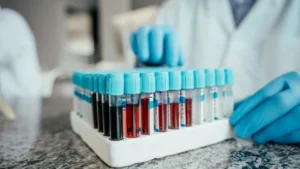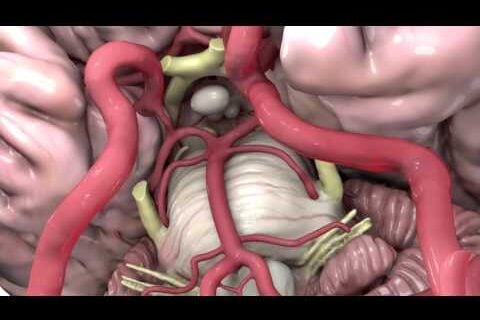DIAGNOSIS: A highly sensitive blood test has reached the market that can identify whether it is likely a patient has amyloid plaques in the brain, or not. Amyloid plaques are among the strongest pathological hallmarks of Alzheimer’s. Learn more.
Patients, advocates, and physicians who have long awaited an easy-to-administer blood test that can help them better understand Alzheimer’s disease now have a health care innovation which they can rely upon.
A breakthrough in Alzheimer’s disease has arrived with the introduction of C2N Diagnostics’ PrecivityAD™ blood test into the clinic.
Researchers at C2N Diagnostics have found the PrecivityAD™ test predicts Alzheimer’s brain pathology in people with memory and thinking issues.
Based on data from 686 patients older than 60 years of age with subjective cognitive impairment or dementia, the PrecivityAD™ test correctly identified brain amyloid plaque status (as determined by quantitative amyloid PET scans) in 86% of the patients.
The Receiver Operating Characteristic (ROC) for the analysis had an area under the curve (AUC) of 0.88. Further details of the test’s diagnostic performance are provided here.
The PrecivityAD™ test is a highly sensitive blood test using mass spectrometry and is performed in C2N’s CLIA-certified lab. While the test by itself cannot diagnose Alzheimer’s disease — which is a clinical diagnosis made by a health care provider — the test is an important new tool for physicians to aid in the evaluation process.
The PrecivityAD™ test does not involve any radiation and is non-invasive. These features are expected to make the test more accessible than other diagnostic methods that physicians use to evaluate issues with memory and thinking.
Blood test unlocks Alzheimer’s mysteries
The proprietary test involves a small blood sample from a person’s forearm. C2N analyzes the blood in its specialized laboratory facility using mass spectrometry to measure the concentrations of amyloid beta 42 and 40 (Aß42 and Aß40), and the presence of apolipoprotein E (ApoE) isoforms in blood. The analysis process is automated and allows for C2N to process samples in a routine and repeatable manner.
C2N will send the physician the patient’s lab report. The lab report details the levels of the biomarkers and provide an overall combined score, known as the Amyloid Probability Score (APS), to assess the likelihood of amyloid plaques in the brain, which are a pathological hallmark of Alzheimer’s disease.
A low APS (0-36) is consistent with a negative amyloid PET scan result and, thus, a low likelihood of amyloid plaques. Absence of amyloid plaques is inconsistent with an Alzheimer’s disease diagnosis and indicates other causes of cognitive symptoms should be investigated.
An intermediate APS (37-57) does not distinguish between the presence or absence of amyloid plaques and indicates further diagnostic evaluation may be needed to assess the underlying cause(s) for the patient’s cognitive symptoms.
A high APS (58-100) is consistent with a positive amyloid PET scan result and, thus, a high likelihood of amyloid plaques. Presence of amyloid plaques is consistent with an Alzheimer’s disease diagnosis in someone who has cognitive decline, but alone is insufficient for a final diagnosis; clinical presentation and other factors should be considered along with the APS.
Knowing that a patient’s symptoms may be due to Alzheimer’s can help inform a physician to prescribe specific Alzheimer’s treatments or lifestyle interventions in order to aid in the management of the disease.
Looking ahead to future goals
A recent study of patients adopting healthy lifestyle behaviors found a dramatic reduction in risk of dementia, between 37% and 60%, depending on intensity of the behavioral changes.
Joel B. Braunstein, MD, CEO of C2N, says, “Our mission is to translate exceptional science into unique diagnostics that can help as many people as possible. The PrecivityAD™ blood test introduces a new option for patients, families and the medical community that have eagerly awaited innovative tools to address Alzheimer’s troubling problems.”
Clinical Laboratory Improvement Amendments (CLIA) regulators have granted C2N’s lab a certificate; CLIA regulates clinical labs to ensure accurate and reliable test results for patient specimens.
The company is also moving ahead with development of a Brain Health Panel that seeks to detect multiple blood-based markers for Alzheimer’s disease to aid in better disease staging, treatment monitoring, and differential diagnosis.
Alzheimer’s community lauds breakthrough
“This is an exciting and much-needed development,” says George Vradenburg, chairman and co-founder of UsAgainstAlzheimer’s. “The advance of blood-based tests for use by physicians in the Alzheimer’s diagnostic process is occurring at a much more rapid pace than many in the field have appreciated.
“Accessible, affordable, and earlier testing by physicians is essential to understand the underlying cause of any cognitive impairment and to more effectively make or rule out a clinical Alzheimer’s diagnosis.
“It is equally important that government and private payers fairly reimburse for the costs of any Alzheimer’s test that can aid in a physician’s diagnosis of Alzheimer’s so that all Americans, regardless of income, can, if they wish, know whether they have Alzheimer’s or not.”
Jeff Cummings, MD, ScD, founding director of the Cleveland Clinic Lou Ruvo Center for Brain Health and research professor, department of brain health, University of Nevada, Las Vegas, says, “Advances in Alzheimer’s diagnostics are key to more effective identification, diagnosis and clinical trial recruitment. A blood test for Alzheimer’s is a game changer.”
Visit www.PrecivityAD.com or call 1-877-226-3424 to learn more. The test is available in 45 states, the District of Columbia, and Puerto Rico; the exceptions are California, Maryland, Pennsylvania, Rhode Island, and New York, which require individual state processes for CLIA labs.
C2N is working toward the requisite certificates that will permit the PrecivityAD™ test to be available in these states in the near future. Please periodically refer to www.PrecivityAD.com or call 1-877-226-3424 for status updates on test availability in these five states.
Details about a financial assistance program and payment plans are also available.
- Development of the PrecivityAD™ blood test has been funded partially by the National Institutes of Health, GHR Foundation, Alzheimer’s Drug Discovery Foundation, and BrightFocus Foundation.
SOURCE:












In Canada, I am a research project named BEAM, in it when approved, a Patient will have an overnight stay in the Hospital, the first night, an eye has something applied to it, the next day, a camera is pointed at that eye, and this product put in the night before, effects Amaloyd Plaques in the eye, and this camera can pick these up
WHAT DIFFERENCE WILL IT MAKE? MEMORYLOSS ISMEMORY LOSS!